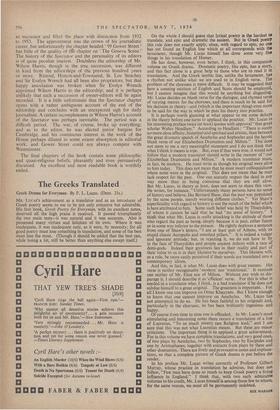BOOKS OF THE WEEK
Janus's Backward Look
By SIR WILLIAM BEACH THOMAS SOME years ago an Irish lady of great charm, a relation of Sir Horace Plunkett, wrote an account of her life under the tide, Seventy Years Young. Mr. Wilson Harris, by way perhaps of celebrating his seventieth birthday, has published his autobiography with a title hardly less happy.* It too suggests, if less directly, that lively, pleasant years remain to be lived. May they be many ! An unusually wide and various group of acquaintances and friends will endorse the wish. Almost all journalists of any fame meet many men and women of distinction, and indeed play their own part in issues of importance. Mr. Wilson Harris may be said to have spent virtually all his more responsible life in journalism. If We except the less notable years at home and at school (both in Plymouth), three years as a scholar at St. John's, Cambridge, and some, so to call them, experimental years as a school- master, the whole of his life was spent as a journalist, first on a daily paper, the Daily News, or News. Chronicle, secondly in weekly journalism, as editor of the Spectator. Nearly all this while, for he was lucky or clever enough to start on the upper level, he was in touch with events and people of some impor- tance, and the range was unusually wide, largely for the reason that many of the most fruitful of his years were spent at Geneva. The League of Nations, which promised peace in Place of war, appealed to all his sympathies as a descendant of Quakers, and he exerted influence there of no little value outside his despatches. Moreover, he was in Paris throughout the discussions on the Peace of Versailles, and incidentally Was almost driven violently into the arms of Clemenceau, Woodrow Wilson and Lloyd George when they were as good as mobbed by an enthusiastic crowd, after the signing of the treaty. Yet more productive of acquaintanceships were the series of conferences that followed the signing of that excessively abused compromise. There, as well as on a sub- sequent lecture tour in North America, the journalist deviated into personal relationship with—to give a few names—Nansen, Genes, Masaryk, Lord Robert Cecil (who was at one time the very soul of the League of Nations), Lord Grey, Woodrow Wilson and Mackenzie King. Now and again, as does happen not infrequently, the journalist was almost compelled into the ranks of diplomacy. A quaint example is given in an account of an early conference at the charming little township of Spa. the editor owing to his anti-French bias). The Daily News felt itself obliged to follow suit, and Wilson Harris was des- patched so abruptly that the regular New York correspondent was not even informed of the arrival of a superior. The supplanter was soon shuttled back to cover the succession of conferences still in spate, at Geneva, at Lausanne and else- where. What they each and all decided has not proved of great historic importance and unhappy far-off conferences make only poor reading today. Happily the references to their discussions and verdicts are in great part relieved by sketches of the distinguished persons engaged. Not' all the more notable acquaintances inspired admiration. Mussolini was first met as a fellow journalist: " How did Italy's great man impress me ? So far as I remember not at all. There was no reason why he should. He had no magnetic personality. He had nothing of Hitler's unquestionable ability. No one could tell what he was to achieve by cold force. At Cannes he was just a journalist among journalists, and there was nothing to suggest that he was a particularly good one."
The contrast with the Mussolini who displayed himself later at Lausanne gives good opportunity for the particular brand of satiric humour that pleased readers of ' Spectator's Note- book.' Poincare among others evoked more caustic and much less humorous comment.
While at Geneva Harris had acted in some sort as correspondent of the Spectator, and thereafter was from time to time called in to write leading articles. When Sir Evelyn Wrench, who had many calls on his energy, decided to give up active editorship, Mr. Wilson Harris was a natural choice as successor and filled the place with distinction from 1932 to 1953. The appointment was the crown of his journalistic career, but unfortunately the chapter headed ' 99 Gower Street' has little of the quality of the chapter on The Geneva Scene.' The history of the Spectator and the personality of its editors is of quite peculiar interest. Doubtless the editorship of Mr. Wilson Harris, though in the true succession, was different in kind from the editorships of the previous hundred years or more. Rintoul, Hutton-and-Townsend, St. Loe Strachey and Sir Evelyn Wrench had all been also proprietors, but that happy association was broken when Sir Evelyn Wrench appointed Wilson Harris to the editorship; and it is perhaps unlikely that such a succession of owner-editors will be again recorded. It is a little unfortunate that the Spectator chapter opens with a rather ambiguous account of the end of the editorship and concludes with an unexpected sigh for daily journalism. A certain incompleteness in Wilson Harris's account of the Spectator was perhaps inevitable. The period was a difficult period. The war, of course, broke up everything; and as to the editor, he was elected junior burgess for Cambridge, and his continuous interest in the work of the House perhaps diluted to some extent absorption in editorial work; and Gower Street could not always compete with Westminster.
The final chapters of the book contain some philosophic and quasi-religious beliefs, pleasantly and even persuasively discussed. An excellent and most readable book is worthily ended.











































 Previous page
Previous page